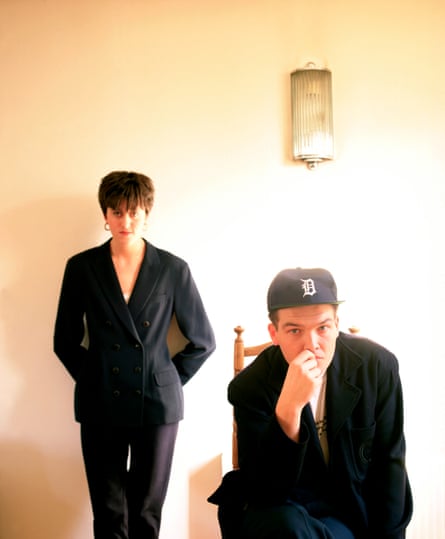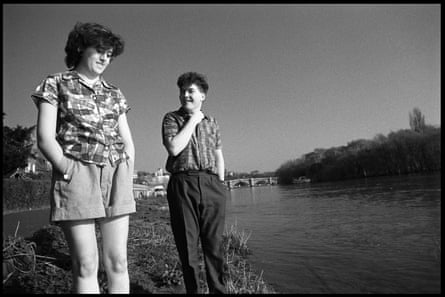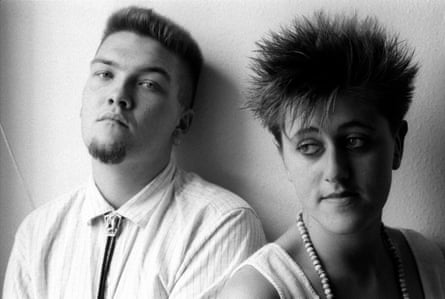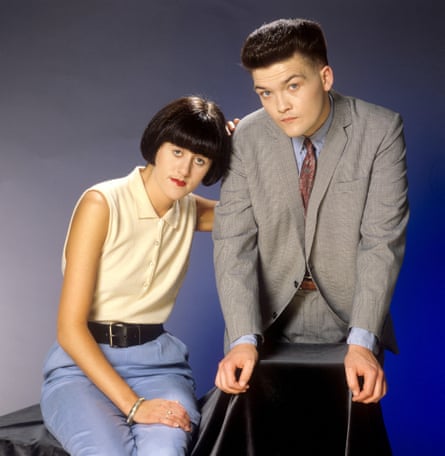In early 1997, Everything But the Girl were at the height of their fame. Fifteen years into their career, they had executed a remarkable turnaround in fortunes. Ben Watt and Tracey Thorn had been dropped by their label after the release of their 1994 album, Amplified Heart, only to see a Todd Terry remix of its track Missing belatedly become a vast global hit: No 2 in the US, double platinum in the UK, topping the charts for weeks around Europe. Their ensuing album, 1995’s Walking Wounded, was both their most successful, and curiously influential. Soon you couldn’t move for singer-songwriters plying their melancholy trade over drum’n’bass breaks or house beats: everywhere from Olive’s No 1 single You’re Not Alone, to Dido. Roni Size and Reprazent sampled them on their Mercury prize-winning debut album, New Forms. The singer Karen Ramirez covered another old EBTG song, I Didn’t Know I Was Looking for Love, in the style of Missing and scored a Top 10 hit. Then U2 asked them to support their US stadium tour, news the duo received while staying in an Australian hotel room so sumptuous it had enough space for a grand piano and offered breathtaking views over Perth.
It was at precisely this point – when the call came from U2 – that Thorn pulled the plug on EBTG, with the winningly nonchalant phrase: “Actually babe, do you know what? I think I want to stop now.” Always equivocal about the anxiety-inducing task of performing, Thorn was filled with “stomach-churning horror” at the thought of appearing in front of 60,000 U2 fans a night. Moreover, she wanted herself and Watt, a couple since their teens, to start a family. So EBTG turned U2 down, made one more album – 1999’s Temperamental – did a few shows and that was that.

Thorn has never played a gig since. She spent the next four years a stay-at-home mum, “happy as a clam” while Watt became a DJ, producer, club owner and boss of the deep house label Buzzin’ Fly. Eventually, both started making low-key, critically acclaimed solo albums – Thorn released four, collaborated with John Grant and German house duo Tiefschwarz and embarked on a parallel career as an author; Watt, tired of “being an A&R person and doing licensing agreements for co-productions”, made three albums in the folky vein of his pre-EBTG solo release, North Marine Drive – but the question of working together again was scrupulously avoided.
“When you’re bringing up a family, there’s just a lot to deal with,” offers Watt. “It’s a big enough drain being parents to three teenage kids, and then to work together, it just all seemed too much.”
“We sort of became quite strictly independent of each other,” says Thorn. “This is my work, I’m going to finish it, you can hear it and make helpful comments, but you’re not part of it.”
And yet, here we are, in a tiny London record company office, unexpectedly discussing the first EBTG album in 24 years. Fuse was announced – nonchalantly again – by Thorn, on Twitter, late last year. Thorn thinks its appearance might have something do with lockdown, of which the couple had an extreme experience. Thanks to his struggle with the rare autoimmune disease Churg-Strauss syndrome, Watt was “on that list of people who got the letter from the government telling them what to do”, Thorn recalls: essentially, stay six feet away from everyone, and even isolate from your family if they’re socialising.
“It was difficult, because we had kids coming and going,” Thorn says. “We didn’t live like that for long, but lockdown went on for a very long time for us. A full two years of living a very quiet life. Towards the end, there was the feeling: ‘What are we going to do next? Are we going to do a project? Are we going to carry on living the life we’re living?’ I started to think: I’d love for us to at least try something with EBTG. If we don’t do it now, or soon, maybe we’ll suddenly realise it’s too late. We’re not getting any younger, you can’t just put this off for ever.”
Watt was hesitant, deterred by the potential pressure. For Thorn, it was just about the joy of collaborating. “‘We’re in this house together, we’re both musicians, no one even needs to know that we tried.’”
Watt was so trepidatious that initially, he says, he “refused to call it EBTG. All the files were just listed as TREN – Tracey and Ben. We had to allow ourselves to fail. It wasn’t like we had a master plan. But it quickly became EBTG – this life seemed to come into it that we didn’t have a lot of control over.” Their shared creative intuition kicked back in. “Sometimes we’d communicate with a look about whether things were good or bad; we seemed to have an instinctive feeling for the economy we wanted to use, the minimalism of the arrangements, the fact that the lyrics should be emotional, not sentimental. All these things that seemed to be a part of what we do suddenly all seemed to fall into place. Which is quite exciting.”

So Fuse picks up where Temperamental left off, setting Thorn’s distinctive vocals – warm but ineffably dolorous – to stark, cutting-edge beats and experimental electronics. The songs are uniformly beautiful. Thorn sings about the need to forgive yourself in an unforgiving moral climate, about how the uncertainty and self-doubt you feel after your kids leave home can remind you of being a teenager and, on No One Knows We’re Dancing, about the hedonistic connectivity of a nightclub, written from the wistful perspective of a man whose need for isolation during Covid led him to take up the more sedate pastime of birdwatching. “Because it was a chance to get out of the house and not talk to anybody,” Watt smiles. “Birders aren’t the most social of beings.”
It also reanimates EBTG’s oft-overlooked willingness to take risks, not least in using effects to render Thorn’s voice, their most celebrated musical asset, virtually unrecognisable: woozy and deep on Interior Space; a faintly FKA twigs-ish electronic chirrup on When You Mess Up. “From day one, we were going: ‘We have to fuck up my voice’,” grins Thorn. “We were desperate to fuck up my voice. It’s one of the key signatures of the band, so it was the most fun thing.”
“The idea of using Tracey’s voice as just another thread in the tapestry became really interesting to me because we have this reputation of: don’t mess with the voice! – that it’s sacred,” says Watt. “But we just thought: well, why?”

Their new enthusiasm for Auto-Tune fits the wilfulness that marked EBTG from the moment Thorn and Watt started making music together after meeting at Hull University in 1982. With the benefit of hindsight, they did give the impression of being people who might pull the plug on their career at its height if they felt like it. On one hand, they were traditionalists: the son of Scottish big band leader Tommy Watt, Ben was steeped in jazz from an early age; their debut single was a guitar-and-vocals cover of Cole Porter’s Night and Day that could have been recorded at pretty much any point since 1932.
On the other, they were very much a product of the bolshie, anti-commercial post-punk environment in which they both had first come to attention – Thorn with the ramshackle Marine Girls and Watt with the oddball drone of his 1981 solo single, Cant. Their approach was stringent, even by the standards of the time: on their debut album, 1984’s Eden, they wouldn’t allow the drummer to hit the snare drum on grounds that the sound was “too rockist”. Backing vocals were also banned for fear they would sound “too glossy, too high production, potentially vacuous”. “You have to remember,” says Thorn, “that we were students making up bollocks. It wasn’t a clear manifesto in many ways, it was lots of different manifestos … manifesting themselves.”
Nevertheless, a certain refusenik attitude clung to EBTG. Initially, at least, they wouldn’t appear on Top of the Pops, decrying the fact that the show’s female dancers performed in cages as sexist. They didn’t like videos, even if they were directed by underground film-maker John Maybury. Thorn declined to look at the camera at all during the making of the promo clip for their 1984 single Each and Every One, staring fixedly at the floor instead. They were openly wedded to leftwing politics, part of the Labour-supporting Red Wedge collective of musicians, and ended up on the cover of NME after performing in the Soviet Union as part of the Communist party’s Festival of Youth and Students. “It was a stunt,” says Watt. “A lot of the young people from Moscow had been bussed out, they really didn’t want them fraternising with westerners, so we ended up performing to KGB staff. Our support act at one of them was a Bulgarian juggler.”

In their early days, they were famously hard work for interviewers – they are, it should be noted, charm itself today – particularly if said interviewers made the mistake of lumping them in with the wave of jazz-influenced pop artists that emerged from London’s early-80s club scene. “Suddenly you find yourself being likened to bands you feel you have absolutely nothing in common with: Matt Bianco, Blue Rondo à La Turk,” says Watt. “It’s just very startling. You start questioning yourself: did I mean that? Is that what it is to other people? When you’re young, the instinct is: ‘Right, we’ll do something else, you fuckers!’”
Listening to EBTG’s 80s catalogue, the most striking thing is how wildly different their albums are to each other: the bossa nova-inflected Eden was followed by the Smiths-influenced indie of 1985’s Love Not Money; a year later, Baby the Stars Shine Bright delved headlong into lavishly orchestrated 60s pop some years before Scott Walker and Jimmy Webb became hip names to drop. “The record label said that production was getting really big, snare drums were this enormous sound, Trevor Horn’s influence was being felt, so we thought: OK, you want a big-sounding record, we’ll make you a big-sounding record – we’ll orchestrate the shit out of it!” laughs Watt.
In 1990, The Language of Life offered up ultra-slick soul of the kind made by Luther Vandross. If it wasn’t for Thorn’s voice, you might be forgiven for thinking each was the work of a completely different artist. Thorn argues for a through-line, “a certain continuity in the songwriting, some of our melodic approaches. If there wasn’t an identity there, there wouldn’t have been an audience that’s stuck with us.”
Still, perhaps it shouldn’t have been such a surprise when they threw themselves so wholeheartedly into dance music in the mid 90s. And perhaps it worked so well because they were enraptured by the sound of drum’n’bass – Watt says the syncopation of the drums reminded him of the jazz he had grown up with. They junked a plan to move to the US and record there in order to become regulars at Fabio and LTJ Bukem’s midweek club Speed on Charing Cross Road and to hang around the basement of Soho’s Blackmarket Records. “It really clicked with me,” says Watt. “Metalheadz, Peshay, Alex Reece – I took one listen and immediately loved it. There was so much space in the records where Tracey’s voice could go.”
He is, he says, still plugged into dance music, despite no longer “being at the coalface” of DJing or running a house label. A quick scan of his ongoing Spotify playlist SpinCycle reveals Ross From Friends and Lord of the Isles rubbing shoulders with John Martyn, Chet Baker, old soul music and post-punk: a neat summation of the range of influences behind EBTG’s sound.
As for the future, they seem uncertain whether Fuse represents a one-off, or the first stage in a more permanent return. “Without wishing to get all mindful on you, we’re trying to be very present,” says Thorn, “because we’re never going to have this moment again, that air of surprise. No one knew we were doing it; we didn’t know we were doing an EBTG record at first. So that’s a great feeling.”
In the past, they would already be looking to the next album, “saying: ‘No, no, no, we’re going to make a better record, we can see already what’s wrong with this one.’ We’re trying not to do that. So I don’t know.” She shrugs, and says – nonchalantly as ever: “See what happens.”
Stay connected with us on social media platform for instant update click here to join our Twitter, & Facebook
We are now on Telegram. Click here to join our channel (@TechiUpdate) and stay updated with the latest Technology headlines.
For all the latest Music News Click Here
